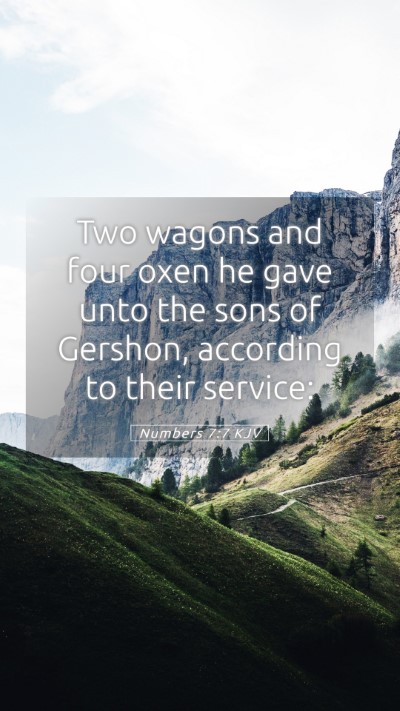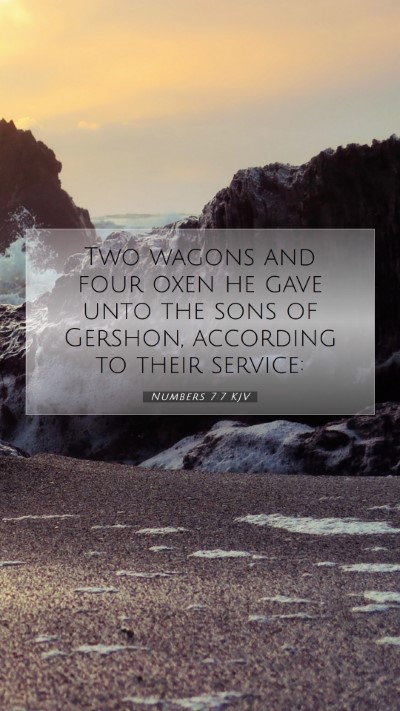Understanding Numbers 7:7 - Bible Verse Commentary
Bible Verse: Numbers 7:7
This verse is part of the larger context wherein Moses is receiving offerings from the leaders of Israel for the dedication of the altar. Specifically, Numbers 7:7 states, "And he took the oxen and the rams, and offered them; and their meat offering was a flour mingled with oil." This action forms a significant aspect of Israel's worship practices.
1. Contextual Overview
Numbers chapter 7 provides a detailed account of the offerings presented by the Israelite leaders following the consecration of the tabernacle. It is critical to grasp the context of sacrificial offerings in ancient Israelite culture, as they were central to their practices of worship and dedication to God.
2. Key Insights from Commentaries
-
Matthew Henry's Commentary:
Henry emphasizes the importance of obedience and the significance of offerings in relation to God's commands. He notes that the offerings symbolize dedication and the leaders' consecration to the tasks assigned by God. Swearing allegiance to God, these offerings reflect their role in maintaining the covenant relationship.
-
Albert Barnes' Commentary:
Barnes provides a meticulous analysis of the sacrificial system, highlighting the types of sacrifices and their meanings. He clarifies that the oxen and rams represent not only material wealth but also the leaders' acknowledgment of divine sovereignty. The mixture of oil with the flour signifies richness and completeness in the offerings, reflecting a gesture of gratitude towards God.
-
Adam Clarke's Commentary:
Clarke discusses the ceremonial aspects of the offerings and their relevance to both the community and God. He argues that through this offering, the leaders are exhibiting a united front in their worship and commitment to God’s plans for Israel. The details regarding the offerings serve to remind the Israelites of their responsibility and privilege in serving the Lord.
3. Theological Significance
The offerings described in this verse reveal crucial aspects of biblical worship:
-
Dedication: The idea of consecration is central, showing that offerings are not simply rituals but acts of dedication to God’s service.
-
Presentation of Resources: By giving their best in sacrifice, the leaders indicate their understanding of stewardship and the importance of prioritizing God in their lives.
-
Covenant Relationship: These offerings embody the ongoing covenant relationship between God and Israel, emphasizing God’s call for commitment from His people.
4. Application for Today
The lessons derived from Numbers 7:7 continue to resonate today:
-
Commitment in Worship: Just as the leaders presented their offerings, modern believers are encouraged to commit their resources, time, and talents to God.
-
Understanding Sacrifice: The act of sacrifice, be it time for service, financial support for ministry, or love for one another, is pivotal in manifesting a relationship with God.
-
Covenant Living: The verse reminds us of our part in the new covenant through Christ, inviting us to reflect on how we can live out our faith daily.
5. Related Bible Cross References
- Leviticus 1:3 - Discusses offerings and their acceptance before God.
- Exodus 29:10-14 - Describes the ritual of offering sacrifices to consecrate the priests.
- Hebrews 10:12 - Refers to Christ as the ultimate sacrifice and the new covenant we participate in.
6. Concluding Thoughts
The interpretation of Numbers 7:7 reflects both a historical and spiritual journey of the Israelites as they navigate their covenant with God. Understanding this verse is crucial for those involved in Bible study groups or seeking to deepen their Bible study insights. It serves as a gateway to exploring profound themes of sacrifice, dedication, and community worship.


